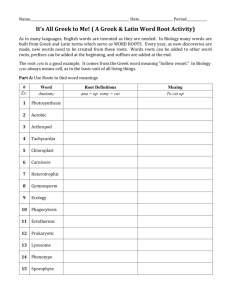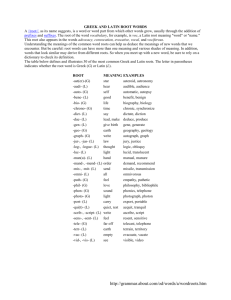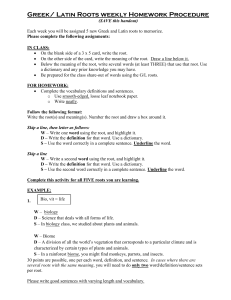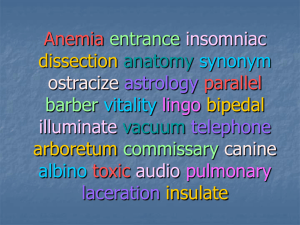Click here
advertisement
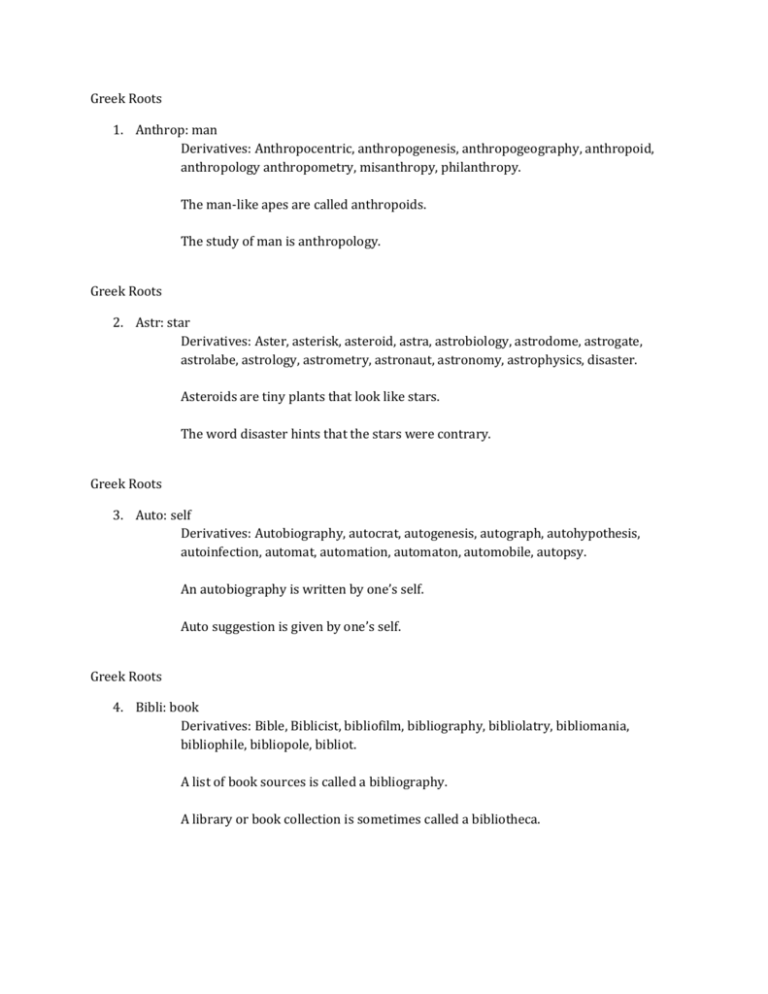
Greek Roots 1. Anthrop: man Derivatives: Anthropocentric, anthropogenesis, anthropogeography, anthropoid, anthropology anthropometry, misanthropy, philanthropy. The man-like apes are called anthropoids. The study of man is anthropology. Greek Roots 2. Astr: star Derivatives: Aster, asterisk, asteroid, astra, astrobiology, astrodome, astrogate, astrolabe, astrology, astrometry, astronaut, astronomy, astrophysics, disaster. Asteroids are tiny plants that look like stars. The word disaster hints that the stars were contrary. Greek Roots 3. Auto: self Derivatives: Autobiography, autocrat, autogenesis, autograph, autohypothesis, autoinfection, automat, automation, automaton, automobile, autopsy. An autobiography is written by one’s self. Auto suggestion is given by one’s self. Greek Roots 4. Bibli: book Derivatives: Bible, Biblicist, bibliofilm, bibliography, bibliolatry, bibliomania, bibliophile, bibliopole, bibliot. A list of book sources is called a bibliography. A library or book collection is sometimes called a bibliotheca. Greek Roots 5. Bio: life Derivatives: Biochemist, biodynamics, biogenesis, biography, biology, biolysis, biometrics, biophysics, biopsy. Biology deals with plant and animal life. The written account for a life is a biography. Greek Roots 6. Chrom: color Derivatives: Chromatic, chromatology, chrome, chromium, chromosome, chromospheres, panchromatic, polychrome. A many-colored print is polychromatic. A lens with a chromatic distorts color. Greek Roots 7. Chron: time Derivatives: Chronic, chronicle, chronograph, chronological, chronology, chronometer, chronometry, chronoscope, synchronize. Chronological order is time order. A motion picture film and its sound effects should be timed together, or synchronized. Greek Roots 8. Crypt: secret Derivatives: crypt, cryptic, cryptogram, cryptographer, cryptography, cryptology, cryptonym. A cryptic remark has a secret meaning. A secret name is a cryptonym. A secret, coded message is a cryptogram, and the fellow who decodes it is a cryptographer. Greek Roots 9. Cycl: circle: wheel Derivatives: cycle, cyclograph, cycloid, cyclometer, cyclone, cyclorama, cyclotron, encyclical, encyclopedia. An encyclopedia gives instruction in the circle of arts and sciences. A circular room with large pictures is a cyclorama. Greek Roots 10. Dec: Ten Derivatives: decade, decagon, deciliter, Decalogue, decameron, decameter, decasyllable, decathlon, decennial, decimal, decimate. A decathlon consists of ten athletic events. A decennial celebrates ten years. Greek Roots 11. Dem: people Derivatives: demagogue, demiurge, democracy, democrat, demography, endemic, epidemic, pandemic. Government by the people is called a democracy. One who uses false claims and emotional appeals to stir up the common people is a demagogue. Greek Roots 12. Derm: skin Derivatives: Dermatitis, dermatoid, dermatologist, dermatophyte, epidermis, hypodermic, pachyderm. Dermatitis is an inflammation of the skin. A skin infection should be treated by a dermatologist. Greek Roots 13. Dyn: power Derivatives: dynamic, dynamism, dynamite, dynamo, dynamometer, dynasty, dyne, electrodynamics, hydrodynamics, thermodynamics. A dyne is a unit of force or power. Mechanical power can be measured by a dynamometer. Greek Roots 14. Gram, graph: write Derivatives: autograph, biography, calligraphy, cryptogram, diagram, epigram, geography, graffiti, gramophone, grammar, graphic, graphite, graphology, holography, lithograph, mimeograph, photograph, seismograph, telegram, typography. A mimeograph makes duplicates of writing. Graphite is used in encils for writing. Greek Roots 15. Hetero: other Derivatives: heterodox, heterodyne, heterogeneous, heterograft, heteromorphic, heteronym, heteroplasty, heterosexual. Hetero means other. Members of heterogeneous group are of various types. A heterosexual person is attracted to the other sex. Greek Roots 16. Homo: same Derivatives: homeopathy, homochromatic, homogamy, homogenous, homogenize homonyms. Those in a group that are all the same, such as all 17 year old boys, create a homogenous group. Words that have the same sound, such as “to”, “too” and “two” are called homonyms. Greek Roots 17. Hydr: water Derivatives: hydraulics, hydrocarbon, hydrogen, hydrography, hydrokinetics, hydrometer, hydropathy, hydrophobia, hydroponics, hydrotherapy. Hydraulics deals with the mechanical properties of water and other liquids. Hydropathy and hydrotherapy involve treatment of disease by use of water. Greek Roots 18. Log: word, study Derivatives: apology, biology, Decalogue, dialogue, doxology, embryology, eulogy, geology, hydrology, logic, mineralogy, monologue, philology, prologue, tautology, theology. Biology is the study of plant and animal life. Mineralogy is the study of minerals. Greek Roots 19. Metr, meter: measure Derivatives: ammeter, barometer, centimeter, chronometer, geometry, hexameter, hydrometer, metrology, metronome, micrometer, seismometer, speedometer, thermometer, trigonometry. A barometer is used to measure air pressure. A chronometer is used to measure time. Greek Roots 20. Morph: form Derivatives: amorphous, anthropomorphic, isomorph, metamorphosis, Morpheus, morphine, morphology. Ovid’s Metamorphoses tells how the gods caused people to change their forms. In linguistics the study of the internal structure and form of words is called morphology. Greek Roots 21. Neur: nerve Derivatives: Neural, neuralgia, neurocirculatory, neurogenic, neurologist, neuromotor, neuromuscular, neuron, neurosis, neurotic. A neurotic suffers from nervous disorder. Neuritis is a painful inflammation of the nerves. Greek Roots 22. Orth: right, true Derivatives: orthochromatic, orthodontics, orthodox, orthogenesis, orthography, orthopedics, orthoscope The orthodox religion is the established “true” faith. The right or correct skeletal deformities is the job of the orthopedist. Greek Roots 23. Paleo: ancient Derivatives: paleobotany, Paleocene, paleography, Paleolithic, paleontology, Paleozoic, paleozoology. The Paleozoic, Paleocene, and Paleolithic periods belong to ancient eras. The study of ancient forms of plant and animal life is called paleontology. Greek Roots 24. Pan: all Derivatives: Panacea, Pan-American, Pan-Asiatic, panchromatic, pancreas, pandemic, pandemonium, panegyric, Panhellenic, panorama, pantheism, pantheon, pantomime. Panchromatic film is sensitive to all colors. A panacea is a supposed cure for all disease or trouble. Greek Roots 25. Path: disease, feeling. Derivatives: antipathy, apathy, empathy, neuropathy, osteopathy, pathetic, pathologist, pathos, psychopath, sympathy, telepathy. A feeling of pity is aroused by pathos or that which is pathetic. Your compassion for another person is sympathy, and your complete projection of yourself into feelings of another person is empathy.
